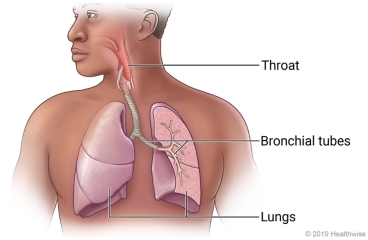
Your Care Instructions
Aspiration pneumonia is an inflammation of the lungs. It may occur after you breathe in foreign material, such as food, liquid, vomit, or mucus.
Aspiration may happen because of a health problem that makes it hard to swallow. These problems include stroke or seizure.
Pneumonia makes it hard to breathe.
Follow-up care is a key part of your treatment and safety. Be sure to make and go to all appointments, and call your doctor if you are having problems. It's also a good idea to know your test results and keep a list of the medicines you take.
How can you care for yourself at home?
To help with swallowing
- You may need to do exercises to train your muscles to work together to help you swallow. You may also need to learn how to position your body or how to put food in your mouth to be able to swallow better.
- You may need to change the foods you eat. Your doctor may tell you to eat certain foods and liquids to make swallowing easier.
- You may need to change how you prepare foods. For example, you may need to add thickeners to some liquids, or puree certain foods in a blender.
To help with pneumonia
- Take your antibiotics as directed. Do not stop taking them just because you feel better. You need to take the full course of antibiotics.
- Take your medicines exactly as prescribed. For example, your doctor may have given you medicine that makes breathing easier. Call your doctor if you think you are having a problem with your medicine.
- Get plenty of rest and sleep. You may feel weak and tired for a while, but your energy level will improve with time.
- Take care of your cough so you can rest. A cough that brings up mucus from your lungs is common with pneumonia. It is one way your body gets rid of the infection. But if coughing keeps you from resting or causes severe fatigue and chest-wall pain, talk to your doctor. They may suggest that you take a medicine to reduce the cough.
- Use a humidifier to increase the moisture in the air. Dry air makes coughing worse. Follow the instructions for cleaning the machine.
- Do not smoke, and avoid others' smoke. Smoke will make your cough last longer. If you need help quitting, talk to your doctor about stop-smoking programs and medicines. These can increase your chances of quitting for good.
- Take an over-the-counter pain medicine, such as acetaminophen (Tylenol), ibuprofen (Advil, Motrin), or naproxen (Aleve) to help reduce fever and reduce chest pain caused by coughing. Read and follow all instructions on the label.
- Do not take two or more pain medicines at the same time unless the doctor told you to. Many pain medicines have acetaminophen, which is Tylenol. Too much acetaminophen (Tylenol) can be harmful.
When should you call for help?
Call 911 anytime you think you may need emergency care. For example, call if:
- You have severe trouble breathing.
Call your doctor now or seek immediate medical care if:
- You have a new or higher fever.
- You have new or worse trouble breathing.
- You cough up blood.
- You are dizzy or lightheaded, or you feel like you may faint.
Watch closely for changes in your health, and be sure to contact your doctor if:
- You do not get better as expected.
- You are coughing more deeply or more often.
Where can you learn more?
Go to http://www.healthwise.net/patientEd
Enter D757 in the search box to learn more about "Aspiration Pneumonia: Care Instructions".
Current as of: September 30, 2025
Author: Ignite Healthwise, LLC Staff
Clinical Review Board
All Ignite Healthwise, LLC education is reviewed by a team that includes physicians, nurses, advanced practitioners, registered dieticians, and other healthcare professionals.

